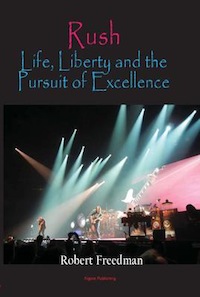 Robert Freedman is an author, journalist, communications professional and keeper of the Rush Vault website who has just released a new book from Algora Publishing titled Rush: Life, Liberty, and the Pursuit of Excellence. Here are some comments about the contents of the 178-page book from the author's website:
Robert Freedman is an author, journalist, communications professional and keeper of the Rush Vault website who has just released a new book from Algora Publishing titled Rush: Life, Liberty, and the Pursuit of Excellence. Here are some comments about the contents of the 178-page book from the author's website:
... Thanks to the work of lots of other people, including Chris McDonald and Durrell Bowman, whose books and Ph.D. dissertations paved the way for many of us who spend a lot of time thinking about the band's music, I found lots of great work to draw on. The one thing that was missing, in my view, was an overarching narrative that put everything the band has done under a single, unifying theme. It was my intention to do that in my book by showing how all of the band's music can be understood as an expression of classical liberalism rooted in Aristotelian individualism. ...
Here's an excerpt from the book's foreword which I had the honor of writing:
"Robert Freedman's book, Rush: Life, Liberty and the Pursuit of Excellence, brings together all the different treatments of Rush's music into one grand, unifying theme, Aristotelian individualism, and shows the historical context into which the band falls. Whether he's looking at Aristotle, Ayn Rand, humanism, or critics' responses to Rush over the years, Freedman brings it all together in a comprehensive history of Rush's lyrical philosophy and does so in an accessible, down-to-earth manner that I think any Rush fan will enjoy." -Ed Stenger, RushIsABand
And here's an excerpt from an early review of the book by Rush, Rock Music, and the Middle Class author Chris McDonald:
... With an engaging writing style, Robert Freedman takes stock of all of Rush's albums and considers how they reflect a unified approach to the challenges, possibilities, and problems of life during the late 20th century and the early 21st. The book builds on previous analyses of Rush by Price, Lombardo, Berti and Bowman, taking Rush seriously as pop culture philosophers, and brings further depth to the argument that Rush's music presents a secular, humanistic, and individualistic outlook that is rare in rock music. Rush fans who actively reflect on the group's lyrical messages will enjoy this opportunity to broaden their understanding of Rush against a particular philosophical background. There is an exciting analysis of Rush's recent Clockwork Angels album, making the book not only up-to-date, but providing a clear sense of how Rush's broader philosophy extends into its newest material. Freedman gives a balanced account of the impact of Aristotelian and Randian individualism on Rush, and by extension, the generation to whom Rush spoke.
You can purchase the book directly from the publisher, or from Amazon and other online retailers.
